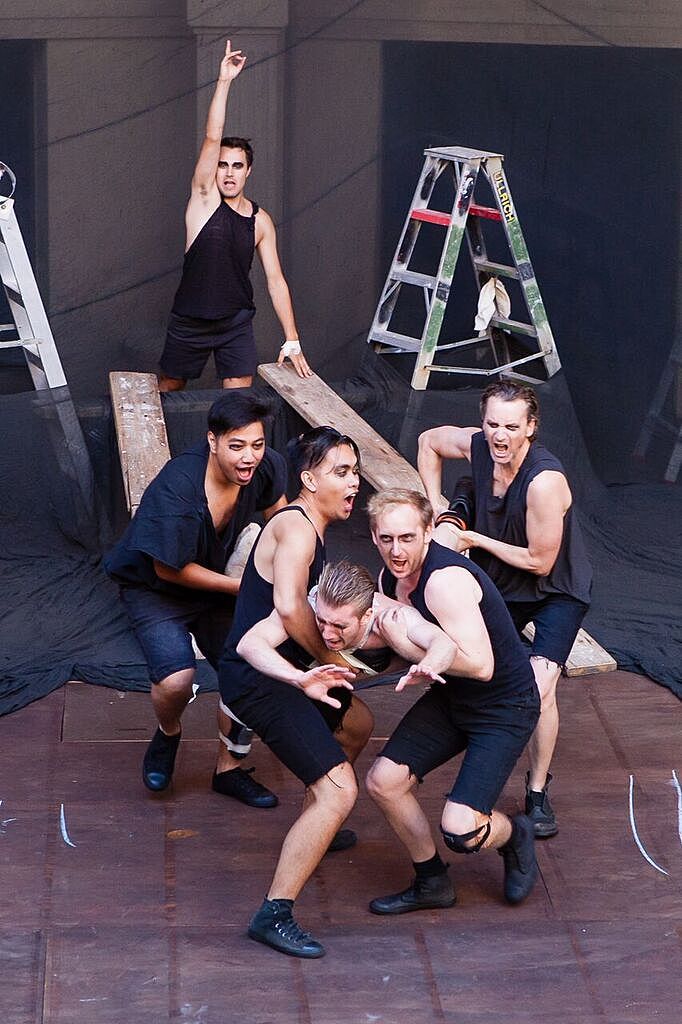Review: Titus
A critically-acclaimed and darkly comic adaptation of Titus Andronicus returns for a season at the Pop-Up Globe - and you can’t afford to miss it.
A critically-acclaimed and darkly comic adaptation of Titus Andronicus returns for a season at the Pop-Up Globe - and you can’t afford to miss it.
Seeing the original production of Fractious Tash’s Titus - staged as part of Unitec’s annual third year production of Shakespeare shows - was a revelation. It wasn’t just a student production of a rarely-performed Shakespeare play with an all-male cast, it transformed Unitec’s standard black box theatre into a post-apocalyptic playground. Ben Henson’s production stripped the text of Titus Andronicus back to its brutal core and then built a primal deconstruction of the masculine desire for violence around it.
When it transferred to the Q Loft, under the Fractious Tash banner, it was a no-brainer. In that space, it felt like you were seeing a world-class Shakespeare production. Three years later, the revival in the Pop-Up Globe feels no less vital, and no less world-class.
The glue that holds this production together is Ben Henson’s vision. Titus Andronicus has been called one of Shakespeare’s problem plays: the plot is uncharacteristically simple and is full of apparently senseless violence. Henson takes that simplicity and that violence and throws a post-apocalyptic sheen over it. The show starts with a group of boys running around playing a makeshift game of soccer with a teddy-bear. Before the game stops, one of the boys, who has been kept at the back of the stage, is brought forward, and the boys crudely tie kneepads around his chest. This is Tamora, Queen of Goths, the prescribed villain of Titus Andronicus. It’s at this point that the play starts.
What this intro does, other than immerse the audience immediately in the action, is let us into Henson’s vision. This isn’t just Titus Andronicus. This is a group of boys, and it is crucial that it is an all-male cast who are performing Titus Andronicus, and thus performing these masculine, violent roles. The genius of Henson’s vision allows us to sit inside that production, but also to see the commentary on it.
In this revival at the Pop-Up Globe, the latter becomes more present than the former. In previous seasons, Titus felt like a one-on-one assault. The lighting and sound were so oppressive, with strobe lighting and Nicki Minaj songs, that it got inside your body before the text did. You could be the only person in the theatre and it would be the same kind of show, it was visceral and very much in the moment.
The arena-style seating of the Pop-Up Globe, as well as the completely stripped-back nature that prevents any modern lighting or sound, means the show is constantly in a dialogue with the audience. We’re having to constantly question our response to the violence, and Henson often abstracts the most brutal moments of the play - chocolate sauce stands in for blood and children’s toys stand in for corpses - that we’re often laughing at the violence. It’s not necessarily because it’s funny, but it’s because we get what Henson is trying to do, and understand the dark humour of it.
These choices bring out the comedy of the show more and, even more powerfully, it implicates us. We’re enjoying this violence, we’re enjoying Tamora’s villainy and scheming, and when we see the results of this scheming, we’re shocked that we were going along with it in the first place.
The rest of Titus adapts well to the Pop-Up Globe space, and while other productions have felt dimmed or constricted by the space, Titus rises to meet it. The oppressive sound mix has been shifted to a jaunty, almost merry, live band and the cast make liberal use of the entire space, including the groundlings pit, to draw the audience into the action as much as possible.
The cast, exactly the same as the previous two iterations, also rise to meet the challenge, and in the four years since the show’s premiere, none of the physicality and tightness that made the piece so arresting has been lost. They embody the text as energetically as they always have, even while interacting with the audience, letting them in on both the jokes and the action. Cole Jenkins’ Tamora remains a highlight of the piece, and he appeals to the audience so much in the first half that he twists the text around him, so much so that Tamora almost becomes the protagonist. Jenkins’ over-this-shit asides and playfulness win us over, and it makes her brutality at the show’s half-way point that much more shocking and harder to swallow. It’s a shock when she orders the death of Andronicus’ two sons, and the rape of Lavinia, and even more of a shock because we were on her side to begin with.
If Jenkins’ Tamora is the light side of this dark comedy, then Eli Matthewson’s Lavinia is the dark. Matthewson’s performance was tremendous in previous iterations of the show, and he shines again here. He winingly captures the light charm of Lavinia in the first half of the show, and he pulls off the character’s descent into madness with a chilling physicality. He externalises Lavinia’s internal damage, more shredded rag-doll than damaged human, and the comic moments in the second half are much more upsetting because we know how far this character has gone. Matthewson digs deep to find the darkness in this character, but also the little bit of light that’s left in Lavinia. He carries the bruised and beaten soul of the show.
Beyond everything else, this is a tight production. The show asks for the cast to be all over the space, switching characters on a dime, and hitting both comic highs and dramatic lows, often all within the same scene. For a company to maintain this tightness four years later - in a completely new space - is a huge achievement. Without this tightness and commitment, the entire endeavour would fall apart. Even when Titus is messy, it’s never a mess.
It’s a joy to see a show like Titus return. It’s as necessary and risky a Shakespeare production as I’ve seen, and one that is truly worthy of the text. Not only is the show loyal to the brutal, violent core of Titus Andronicus but the cast and production take as many risks as the text does. Where the text gives them a challenge, Fractious Tash picks it up and carries it to its destination. That’s what we should be doing with Shakespeare, and Titus doing it four years after its premiere, and even better than it did back then, is something that should be celebrated.
Titus runs at
The Pop-Up Globe
from March 13 - March 20
For tickets and more information, go here.


